Tech News
BlackBerry goes up for sale after years of struggle in smartphone market
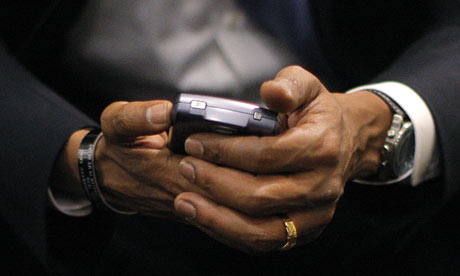
Once dubbed the ‘CrackBerry’, the smartphone company suffered a calamitous decline in the business it helped revolutionise

BlackBerry, once the global leader in smartphone technology, has put itself up for sale after years of falling sales and failed revamps.
Once seen as so habit-forming its users dubbed it the “CrackBerry”, Blackberry has suffered a calamitous decline as rivals revolutionised the business it did so much to start. On Monday the company previously known as Research in Motion (RIM) announced it had decided to “explore strategic alternatives”. Buyers are being sought, though the company could also go private or be broken up. Few analysts expect a turnaround.
Unable to match Apple‘s iPhone for cool or the sheer range of devices from Samsung and others using Google’s Android mobile system, its market share has collapsed from close to 50% in the US in 2009 to less than 3%, according to figures released last week by the analyst IDC. On the day the news broke, the Z10, BlackBerry’s latest, much-hyped device was being offered for $19.99 by US mobile retailer Wirefly. It was selling for $199 when it was launched earlier this year.
For BlackBerry watchers, the news is no surprise. The company lost $84m in the last quarter and announced 5,000 layoffs last year. “The beginning of the end started some time ago,” said Stuart Jeffrey, analyst at Nomura Securities. He said the company’s statement suggested it no longer had any confidence in its ability to get out its current predicament. BlackBerry, he predicts, is likely to re-emerge as a software company, perhaps with some contracts for super-secure government devices, but “without the handicap of all those uncompetitive handsets”.
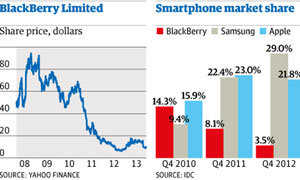
How a company that once defined the smartphone messed up so badly is likely to become a classic case study for business schools around the world. The first BlackBerry device, an email pager, was released in 1999 and allowed busy execs to collect and reply to their messages on the go in a way that revolutionized business communications. The BlackBerry Curve, Pearl and Bold followed shortly after, adding cameras and features to broaden the company’s appeal to consumers.
But then in 2007 came the iPhone. At first BlackBerry relied on its ties to the business community and its perceived advantages in security to fend off Apple’s attack. It didn’t work. Apple’s Steve Jobs had spotted that mobile devices were becoming media devices – powered by the increasing prevalence of Wi-Fi and more high powered mobile networks – music and games were set to be as important as email in the smartphone future. Google was soon chasing Apple in the mobile market with its Android operating system, Blackberry fell further behind. The arrival of apps let people personalise their mobiles and further changed the ways they used their devices.
When Apple launched the iPad, BlackBerry responded with its own tablet the PlayBook, which proved a massive failure and underlined how far behind the company had fallen. Blackberry was left looking clunky and uncool in a sector that was becoming ever more fashion conscious and fast moving.
In 2012 Marissa Mayer, a hotshot former Google exec, was drafted in to revamp Yahoo, another tech giant with an image issue. One of her first moves was to scrap company BlackBerrys. “We literally are moving the company from BlackBerrys to smartphones. One of the really important things for Yahoo’s strategy moving forward is mobile,” she told Fortune magazine, suggesting BlackBerry was neither a smartphone nor important in mobile.
Even Barack Obama, for long BlackBerry’s most high-profile fan, seems to have cooled on the company. As a candidate in 2008, Obama criss-crossed America with his BlackBerry seemingly glued to hand. After his election there were fears he might have to end his CrackBerry addiction due to security fears. But he fought hard, and successfully, to keep the device. “Let the man have his BlackBerry,” John Podesta, co-chairman of Obama’s transition team, told security chiefs. Without it “he’d be like a caged lion padding restlessly around the West Wing, wondering what’s happening on the other side of the iron bars that surround the People’s House”.
The president is still a BlackBerry man and could be spotted bashing away at his device during his inauguration in January. But daughters Sasha and Malia stole the show snapping pictures of their kissing parents on their iPhones. And even Obama now reportedly prefers to use an iPad for security briefings.
BlackBerry launched its latest operating system, BlackBerry 10, and three new devices this year. They got positive reviews. But, says Carolina Milanesi, analyst at Gartner, it was too little and way too late. “They have suffered a fate a lot of big guys suffer from. They were the first to market, they created the smartphone as we know it. They just didn’t see what was coming next,” she said.
“People can choose what device they want for work these days, and they don’t want BlackBerry. Brand is important, cool factor is important, and BlackBerry lost out on that. But even that’s not enough these days,” she said. “You need the eco-system, you need to offer the same experience on different devices.”
Smartphones these days are more about music, photos and video than they are about email. BlackBerry for too long relied on its business customers to keep it in the game, said Milanesi. “But these days you don’t want to be boring in business.
source: http://www.theguardian.com/technology/2013/aug/12/blackberry-for-sale-smartphone-market


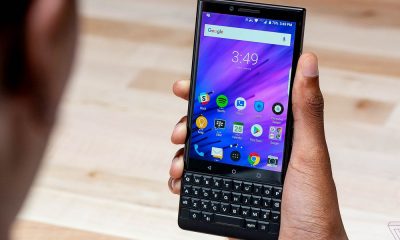

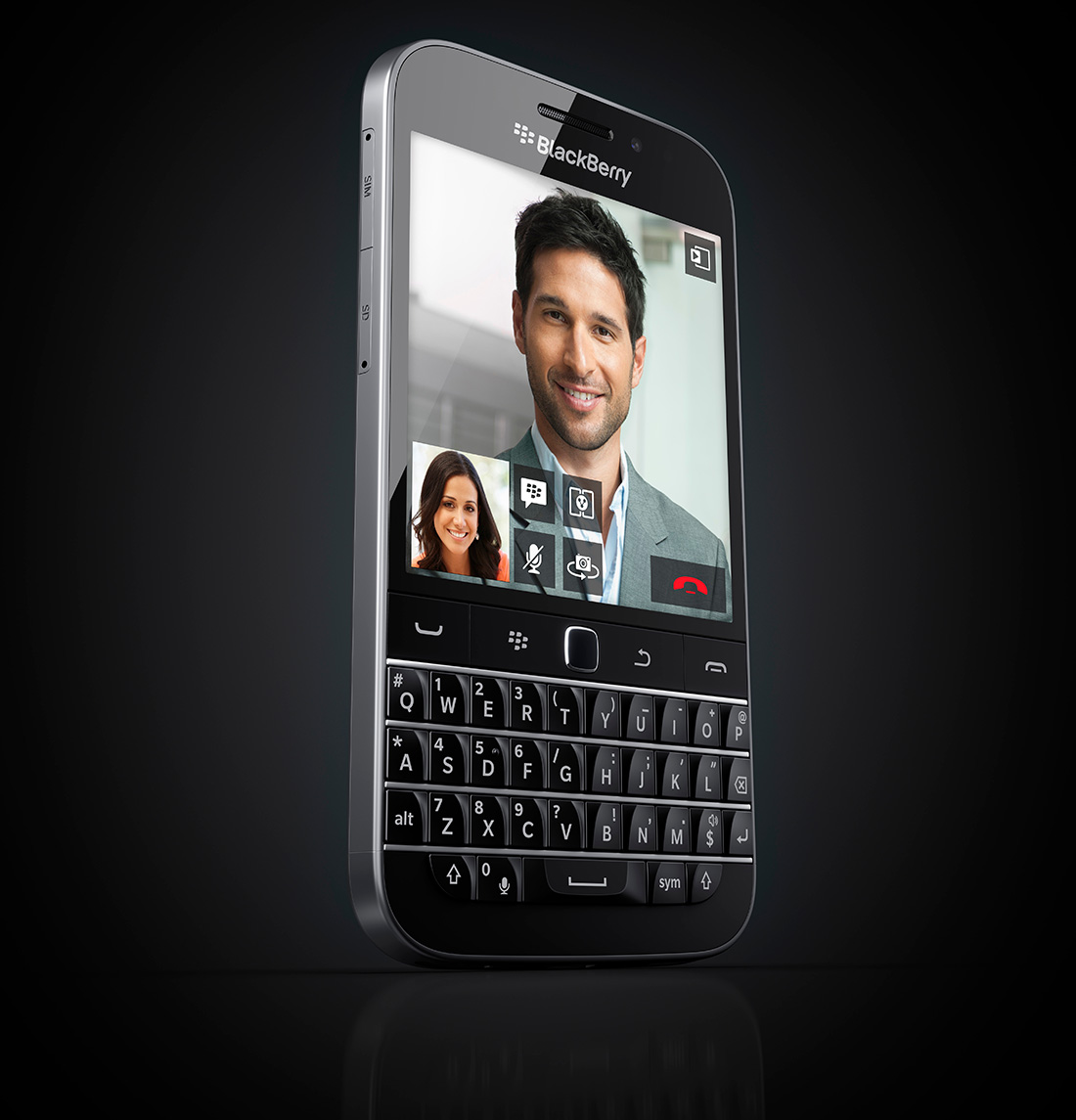
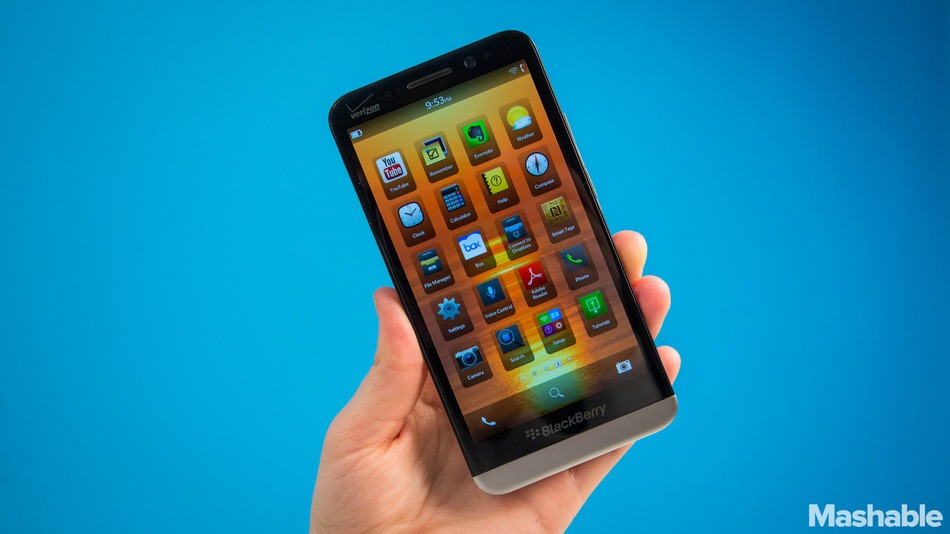
9 Comments